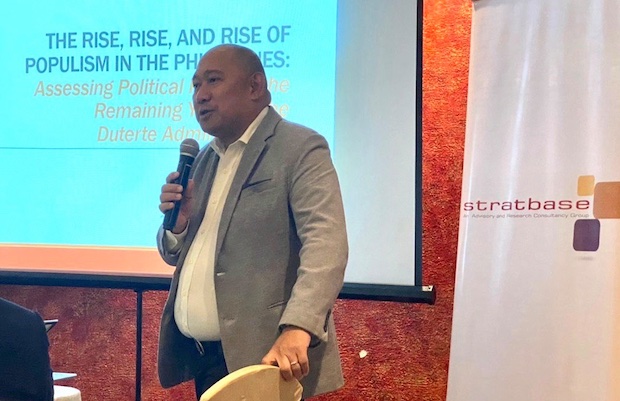
Dindo Manhit, shown here at a 2020 forum, is the founder and president of Stratbase ADR Institute. (File photo from the Facebook page of Stratbase ADR Institute)
MANILA, Philippines — “To build the Filipino nation, we need a three-way trusting relationship among the government, private sector, and civil society,” said Victor Andres “Dindo” Manhit, president of the Stratbase ADR Institute in a statement issued on Monday.
The administration of President Ferdinand Marcos Jr. should aim for this to enable the nation to transition from a consumption-led economy to an investment-driven one, Manhit said.
That would create more jobs, thus closing the gap between rich and poor, and improve the standard of living for Filipinos, he added.
Non-resident Stratbased fellow Edwin Santiago, an associate professor at De La Salle University, also suggested watching the performance of the Philippine economy through various global indices — the World Governance Index, Ease of Doing Business, Global Competitiveness Index, Index of Economic Freedom, Rule of Law Index, Corruption Perceptions Index, and the Open Budget Index.
Santiago said that the government should pursue policies that would reflect improvements in these indices.
“In the final analysis, what is important is that the evaluation of any administration should be done objectively and that it comes with a forward-looking perspective,” Santiago said.
Another Stratbased fellow, Dr. Rizal Buendia, stressed the importance of holistic governance.
“Public management is built largely around the notion of performance and improving the effectiveness of public institutions,” he said.
He stressed the importance of improving information systems that would integrate the front-end government parts — or those that deal with and provide services to citizens.
“If transformation is to be realized, government people have to learn to participate actively in the process of integration, give up some political or organizational interests, and mobilize resources to appropriate agencies and offices.”
Political science professor Francisco Magno, for his part, emphasized that politics should be used as an instrument for achieving development and sustainability in society.
He thus advised the Marcos administration to focus on public service, meeting the needs of the people.
“Anticipatory governance – using the future to create multi-lateral learning and foster intelligent and inspired organizations – should provide the path for Marcos Jr. to veer away from the Marcos Sr. legacy and to move toward the future,” he said.
Manhit then urged the private sector, civil society, and concerned citizens to hold leaders responsible for the reform initiatives they had promised to pursue, adding that this is how we should evaluate Marcos’ leadership.
“We must continue engaging with the government, partnering when and where possible for various efforts,” Mahit said.
“All governments must be evaluated objectively across widely accepted governance standards. This is how we help our country become better,” he added.
RELATED STORIES
Improve governance, tackle daily concerns of Filipinos – experts to gov’t
Best good governance tool? Expert says it’s digital shift with citizen inclusion
Study: PH political institutions ‘corroded by personality-based governance’

